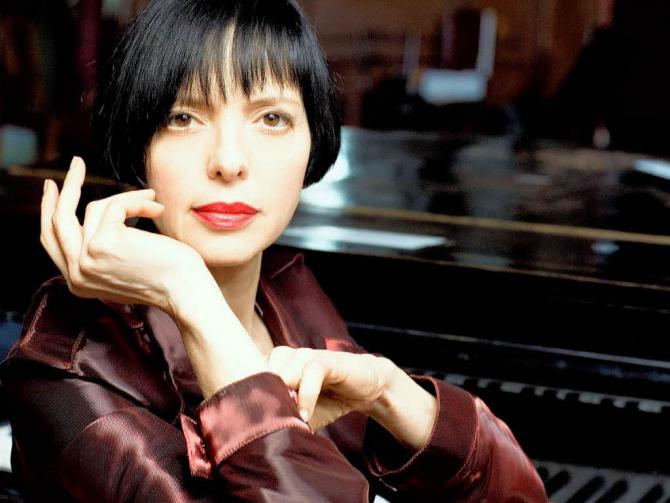
When thinking of the music of Kurt Weill during his centennial year of 2000, the name of Helen Schneider naturally comes to mind. The American singer-actress has performed even more frequently in Weill's country of birth, Germany, than in the USA, and she is closely identified with Weill's work. In fact, she headlined at the Dessau Festival in Weill's home town during the centennial celebration in August 2000. In October and November she's starring in a double bill of Weill's Mahagonny Songspiel and Seven Deadly Sinsin Vienna.
Most writers divide Weill's career into two distinct halves -- the German and the American. Lotte Lenya disagreed with that and said of her husband: "there's only one Weill." Andrea Marcovicci takes the other side, and points out how much his music changed after he came to America. [See my September 2000 story on Marcovicci and Weill in Totaltheater's Periodica section. Also see my story about Weill's collaboration with conductor Maurice Levine in Periodica.] Schneider emphatically aligns herself with the One Weill school. "Of course his music evolved," Schneider says, speaking from her home in Connecticut in mid-September. "He grew, his interests changed, he tried new ideas. But one thing that remained constant was his affinity for great collaborators. He found connections with some of the world's greatest writers, from Brecht in Germany, through Paul Green when he first came to America, and then Maxwell Anderson, Ogden Nash, Moss Hart, Ira Gershwin, Alan Jay Lerner and Langston Hughes. They sought him out and Weill was attracted to their ideas. Weill changed the expectations for musical theater. He paved the way for Sondheim." Because there's such variety in his music, Schneider says she can do a full evening of Weill and not be redundant. She has done so in New York, Philadelphia and elsewhere. She is in conversation about an appearance at Manhattan's Algonquin Hotel in February, 2001.
Schneider, like Weill, bears a German family name. Her grandfather on her father's side came to the United States from Germany in 1919. But all of her other antecedents were Russian Jews, and Helen knew very little about German culture -- and didn't speak the language -- when she first was invited to perform there in 1977. "I go where the work is," she says, "so I accepted the invitation and received wonderful acceptance. Later, I learned the German language." When she played Sally Bowles in a Berlin production of Cabaret in 1987 she studied the history of German cabaret and music halls "and that's when I became enamored with Weill."
Born in Brooklyn in 1953, Schneider moved to Pomona, NY, where she graduated high school. She studied classical piano and was a soloist in a youth choir which performed Berlioz' “Lelio” at Carnegie Hall. She then began to sing rock music and ran away with a blues band at 17. Later she was an opening act for Flip Wilson, David Brenner, Bill Cosby, Robert Klein and David Steinberg on tour and in Las Vegas. When she played Sally Bowles, the German press praised her "grace, sex, sandpaper in her voice and cat-like movements." Other highlights of Schneider's career include an 18-month run as Norma Desmond in Sunset Boulevard in Germany and a musical about the life of Mexican artist Frida Kahlo. Schneider was featured in Ghetto on Broadway and starred in the world premiere of Frida at the American Music Theater Festival in Philadelphia in 1991, later in Boston and the Brooklyn Academy of Music, and will be appearing in productions of it in 2001 in Vienna, Berlin and Mexico City.
Her CD, “A Walk on the Weill Side,” shows her to be a distinctive interpreter. Schneider uses a variety of accents, including Cockney and French, to delineate the characters of the songs. Most of her interpretations are quiet and intimate, but she sometimes rises to exciting, dramatic climaxes. Then, too, she can give a straight-out romantic reading, as she does with "What Good Would the Moon Be" from Street Scene. One of the highlights of the CD is "I Wait For a Ship," a yearning ballad from Weill's almost-forgotten 1934 Parisian musical, Marie Galante. It shows a lushness that presages the work he was soon to do in the USA, but it was written before Weill ever visited America. The German-language album of Sunset Boulevard, starring Schneider, reveals the most gorgeously-sung of all the fine Norma Desmonds that I've heard.
When she gave a concert at Alice Tully Hall in Manhattan, Stephen Holden wrote of her in the New York Times: "Although Ms. Schneider has a far more attractive and pliable voice than such European prototypes as Lotte Lenya and Ute Lemper, she lends even the sweetest ballad a hint of ironic astringency. he wistful Weill-Anderson ballad, `It Never Was You' was deconstructed into a sweeping dramatic monologue." She has recorded 14 albums, spanning the worlds of rock, blues, theater and jazz. Her upcoming CD, "A Voice And A Piano," will be on the Preisser label. It will include songs ranging from Bob Dylan to Arlen, Weill, Kander & Ebb, Webber and Sondheim.
[END]
